|
|
|
Sort Order |
|
|
|
Items / Page
|
|
|
|
|
|
|
| Srl | Item |
| 1 |
ID:
177684
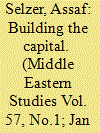

|
|
|
|
|
| Summary/Abstract |
The Declaration of Independence of the State of Israel makes no mention of the country’s aspirations regarding its borders; neither does it mention the name of the state’s capital. The absence of these features was due to the state of war that the country faced at the time of the declaration, as well as the fact that according to the Partition Plan (UN Resolution 181), Jerusalem was supposed to come under international control. This article discusses Israel’s actions in the area of Jerusalem under its control. In December 1949, it was officially decided to transfer the institutions of government to Jerusalem. The state institutions were initially scattered around the city, but a government compound began to be developed later. The article will focus on the development of this compound, presenting the decisions that were implemented in order to turn it into a capital within a city.
|
|
|
|
|
|
|
|
|
|
|
|
|
|
|
|
| 2 |
ID:
177689
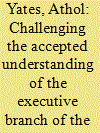

|
|
|
|
|
| Summary/Abstract |
The accepted understanding of what constitutes executive government in the United Arab Emirates (UAE) is that power rests with the Cabinet. This is, however, only partially correct. In reality, executive power over national security is excised from the Cabinet, and instead rests with a group of legislatively-defined agencies and posts. In other words, institutionally the UAE’s executive branch is bifurcated, with one part handling ‘high’ policy, meaning national security, and the other ‘low’ policy, that is all the rest. This article describes the unobserved part of the UAE’s executive branch. In doing so, it provides a significant advance in the understanding of the somewhat opaque nature of government in the UAE. Importantly, it provides a more nuanced understanding of the sources of power as they relate to the powerful Sheikh Mohammed bin Zayed Al Nahyan, a person often (mis)characterised as the de facto leader of the UAE.
|
|
|
|
|
|
|
|
|
|
|
|
|
|
|
|
| 3 |
ID:
177682


|
|
|
|
|
| Summary/Abstract |
Up until the late eighteenth century, the economic understanding of the Ottoman elite was based on the worldview of the scholars of the Madrasah system. The first Ottoman treatises in modern economics began to be written in the second quarter of the nineteenth century, close to 300 years after the emergence of the subject during the Mercantilist era. The nineteenth century witnessed a gradual increase in economic analyses, together with the introduction of the subject in various institutions of higher education. However, a breakthrough in the development of economic thinking in the country had to wait until the foundation of the Republic in 1923, the emergence of the journal Kadro and the establishment of Istanbul University a decade later. This article traces the emergence and development of economics in the Ottoman Empire and in the first decade and a half of the Turkish Republic.
|
|
|
|
|
|
|
|
|
|
|
|
|
|
|
|
| 4 |
ID:
177692
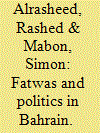

|
|
|
|
|
| Summary/Abstract |
Religious discourse has a fundamental impact on sectarian violence, stability and sovereignty across the Gulf region. Amidst an increasingly volatile political and social situation, fatwas serve as a prominent factor in the behaviour and beliefs of individuals and groups across the Gulf. Fatwas have long been a source of great interest in religious studies and international law yet very little work has been undertaken in politics. This article aims to analyse the impact of fatwas from Shiʿi and Sunni clerics in the promotion of sectarian violence across Bahrain in the aftermath of the Arab Uprisings. In this article, it will be argued that religious discourse has a significant impact in determining the nature of the political relationship between the components of society in Bahrain. We argue that fatwas serve a key role in regulating life across the island and, in the aftermath of the 2011 uprisings, in facilitating sectarian violence.
|
|
|
|
|
|
|
|
|
|
|
|
|
|
|
|
| 5 |
ID:
177687
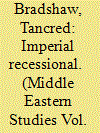

|
|
|
|
|
| Summary/Abstract |
The British imperial project in the Bahrain, Qatar and the Trucial States originated in the early nineteenth century when the Government of India signed treaties with the rulers of the sheikhdoms. It was a model of low-cost imperialism in which the British secured their economic and strategic interests. Whitehall rarely intervened until the Labour Party came to power in 1964. Domestic economic and political considerations led Harold Wilson to announce in January 1968 that the British would withdraw from the Gulf by the end of 1971. This decision was devoid of any strategic rationale, and was regarded with dismay by the rulers of the sheikhdoms. The rulers were responsible for establishing a political structure, and until the summer of 1970 the Foreign Office left them to their own devices. The election of the Conservative government in June 1970 led to a fundamental re-evaluation of the Foreign Office’s policy and Sir William Luce was appointed to establish a viable political structure for the sheikhdoms. Against the odds, Luce and the Foreign Office played a key role in creating the United Arab Emirates. Bahrain and Qatar became independent states.
|
|
|
|
|
|
|
|
|
|
|
|
|
|
|
|
| 6 |
ID:
177683
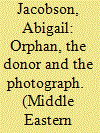

|
|
|
|
|
| Summary/Abstract |
This article uncovers the short history of the American Colony Christian Herald Orphanage, operating in Jerusalem following the First World War. Hosting around 36 Christian and Muslim girls, the orphanage relied on the financial support of the American-based Christian Herald newspaper. Through the close analysis of this institution, and the comparison with a Jewish orphanage in Jerusalem, the article will critically discuss the links between humanitarianism and photography. The sources used are an annotated photograph album documenting life in the Orphanage, as well as the Record Book documenting the girls who received support through the orphanage. Using these visual materials, the article addresses the ways photographs were used as part of fund-raising, missionary work and relief efforts in the context of Mandatory Jerusalem, and discusses the complex relationship between the orphan girl, the donor who supports her, and the way this relationship is constructed in the photograph.
|
|
|
|
|
|
|
|
|
|
|
|
|
|
|
|
| 7 |
ID:
177686


|
|
|
|
|
| Summary/Abstract |
This article analyzes the Egyptian regime’s quest to establish Islamic legitimacy for the transition from conflict to peace with Israel between 1977 and 1981. Based on an integrative analysis of a wide range of sources, it demonstrates that Islamic argumentations were at the core of Egypt’s official state campaign for peace. The appeal to Islamic justifications facilitated the regime’s efforts to describe its innovative peace policy as a natural link in the chain of traditional religious sequences and enclosed it within deeply socially embedded Islamic concepts and principles. Through a comparative analysis with the Islamist anti-peace campaign that the regime sought to refute, the article highlights that ‘Islam’ has no essential, consensual stance on peace with Israel. Rather, it demonstrates that different Muslim actors draw divergent – sometimes diametrically opposed – positions from Islamic texts in accordance with their particular needs and outlooks.
|
|
|
|
|
|
|
|
|
|
|
|
|
|
|
|
| 8 |
ID:
177681


|
|
|
|
|
| Summary/Abstract |
In modern Turkey, male circumcision is so inextricably linked with Muslim identity that one may assume it a practice universally performed by them for centuries. However, a significant number of Muslims in the late Ottoman Empire were uncircumcised. This article argues that circumcision became a universal Muslim practice through the infrastructure and bodily surveillance of the Ottoman central state and modern physicians who considered circumcision a requirement for public health, rather than solely as a key religious practice. Through circumcision, the late Ottoman state not only aimed to crystallize the Islamic character of its Muslim population but also to secure its political loyalty through the link of religious and political identity. The growing state infrastructure, specifically modern education and conscription enabled the central state to interfere with the bodies of its population in a way previously impossible. This process, however, should not be understood as a mere state imposition on the society. Local populations usually welcomed the state-led circumcision campaign as it relieved them of a financial burden. Thus, circumcision became ingrained in Muslim life as a result of the Ottoman modernization in which state and local interests, traditional and modern elite interests, and religious symbolism and secular strategies overlapped.
|
|
|
|
|
|
|
|
|
|
|
|
|
|
|
|
| 9 |
ID:
177685
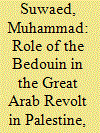

|
|
|
|
|
| Summary/Abstract |
This article focuses on the Bedouins’ part in the Great Arab Revolt in Palestine – during the time of the British mandate; what motivated some clans/tribes to join a given side, and why others chose to remain neutral – and it also refers to the later implications of these different choices. The article briefly overviews the social and political developments that led to the Revolt, explains the unique status of the Bedouin within the Arabic-speaking population in the area, and describes the internal diversity among Bedouin groups and the different alliances they made with the British Mandatory authorities and with other segments of the population.
|
|
|
|
|
|
|
|
|
|
|
|
|
|
|
|
| 10 |
ID:
177690
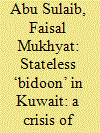

|
|
|
|
|
| Summary/Abstract |
This article aims to examine the issue of stateless ‘bidoon’ in Kuwait. The study explores the historical background of the bidoon issue in Kuwait. It finds that the bidoon issue has been influenced by internal and external factors since the emergence of this problem in the 1950s in Kuwait. However, the main object of this study is to trace the relationship between statelessness and political alienation. Thus, it examines the case study of the bidoon in Kuwait to determine whether they feel political alienation. The study relies on a survey to answer this question. A questionnaire, which comprises the three main aspects of political alienation, powerlessness, normlessness, and isolation, was distributed to a sample of 719 bidoon individuals in Kuwaiti society. The study found that most of the research sample of bidoon in Kuwait feel political alienation. Therefore, the study concluded that the feeling of political alienation among bidoon has critical effects on Kuwaiti national security, including crimes and political violence.
|
|
|
|
|
|
|
|
|
|
|
|
|
|
|
|
|
|
|
|
|